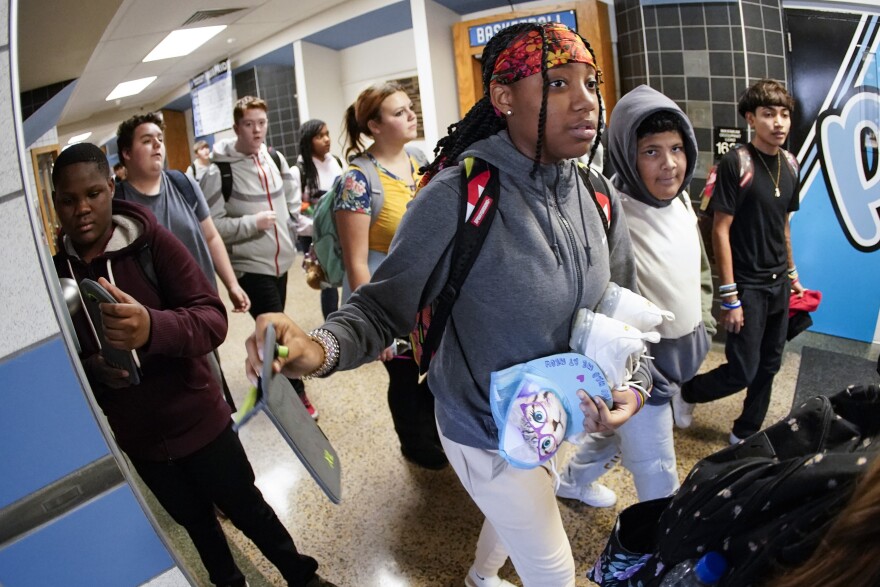Education
Pennsylvania Schools Divided Over Proposed Smartphone Ban

State lawmakers in Pennsylvania are considering a new statewide legislation that would ban smartphones from K-12 classrooms. This proposal, introduced by legislators from both major political parties, has sparked a debate among school leaders regarding its effectiveness and appropriateness. A recent survey conducted by Congressman Chris Deluzio reveals that while a significant portion of residents supports a ban, school districts have varying opinions on how to approach the issue.
Deluzio’s survey, which gathered responses from residents and school district leaders in Allegheny and Beaver counties, indicated that over three-quarters of the 709 participants believe schools should implement a ban on smartphones during class. Despite this consensus among the public, the responses from school districts were more diverse. Some school leaders expressed a desire for a uniform state mandate, while others preferred to retain the autonomy to develop their own cellphone policies.
Currently, of the 48 districts, charter schools, and private institutions that responded to the survey, 11 have already instituted smartphone bans. For example, the Quaker Valley School District mandates that elementary and middle school students keep their phones and smartwatches powered off and stored away throughout the school day. High school students are allowed limited and supervised usage. The district emphasized that each of Pennsylvania’s 500 school districts has unique needs that should be considered, making a “one-size-fits-all” approach challenging.
In addition to Quaker Valley, the Woodland Hills School District has also implemented a policy where students are required to store their phones in locked pouches or submit them at the start of the day. The district has reported a smooth transition since beginning this practice three years ago at the middle school level. A representative from Woodland Hills stated, “We would prefer it to be a state mandate, so it is consistent across neighboring school districts.”
Deluzio has noted that the differences among districts often stem from resource disparities. He emphasized that any legislative action regarding smartphone restrictions must include funding support to help schools adapt. “At the end of the day, we’re talking about making the classroom environment better for kids to learn and better for teachers to help them learn,” said Deluzio, a Democratic representative.
Nationally, over half of U.S. states have enacted some form of cellphone restriction in schools. Despite Pennsylvania’s efforts to encourage schools to create their own policies, such as offering grant funding for lockable bags, only 18 schools applied for these funds. In August 2023, state representative Mandy Steele introduced legislation that would require students to securely store their phones during the school day. This bill, which has garnered bipartisan support, includes exceptions for emergency responders and students with special permissions.
State senator Devlin Robinson is also preparing to introduce similar legislation. His proposed ban would require students to put away their phones from the start to the end of the school day, while allowing individual school districts to decide how to implement the ban. Robinson noted that he has heard from many teachers who are frustrated by students’ inability to focus in class. “Taxpayers expect schools to educate our children and ensure they are not being distracted at school,” he stated.
Concerns regarding the impact of cellphones on students’ academic performance, mental health, and attention spans are prevalent. Recent reports indicate that more than half of school leaders nationwide believe cellphone use and social media are detrimental to students’ educational outcomes. Some schools, such as the Lincoln Park Performing Arts Charter School in Beaver County, have reported improvements in student focus and school culture since implementing smartphone bans last year.
As discussions continue, Deluzio expressed optimism about the growing interest in reform across his district. “Parents across the political spectrum really want to see something change,” he said. “A classroom is a place where we can hopefully get something done to protect these kids.” The debate over smartphone policies in Pennsylvania schools illustrates the complexities of addressing modern challenges in education while balancing the diverse needs of local communities.
-

 Technology5 months ago
Technology5 months agoDiscover the Top 10 Calorie Counting Apps of 2025
-

 Technology3 weeks ago
Technology3 weeks agoOpenAI to Implement Age Verification for ChatGPT by December 2025
-

 Health3 months ago
Health3 months agoBella Hadid Shares Health Update After Treatment for Lyme Disease
-

 Health4 months ago
Health4 months agoAnalysts Project Stronger Growth for Apple’s iPhone 17 Lineup
-

 Health4 months ago
Health4 months agoErin Bates Shares Recovery Update Following Sepsis Complications
-

 Technology5 months ago
Technology5 months agoDiscover How to Reverse Image Search Using ChatGPT Effortlessly
-

 Technology3 months ago
Technology3 months agoElectric Moto Influencer Surronster Arrested in Tijuana
-

 Technology5 months ago
Technology5 months agoMeta Initiates $60B AI Data Center Expansion, Starting in Ohio
-

 Technology2 months ago
Technology2 months agoDiscover 2025’s Top GPUs for Exceptional 4K Gaming Performance
-

 Technology5 months ago
Technology5 months agoRecovering a Suspended TikTok Account: A Step-by-Step Guide
-

 Health5 months ago
Health5 months agoTested: Rab Firewall Mountain Jacket Survives Harsh Conditions
-

 Lifestyle5 months ago
Lifestyle5 months agoBelton Family Reunites After Daughter Survives Hill Country Floods





















